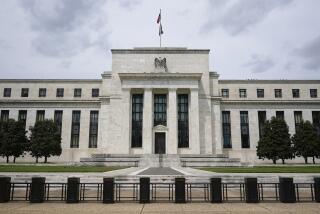Banks Making It Tougher to Use Check ‘Float’
- Share via
NEW YORK — Most of us do it from time to time: Write a check for groceries the day before payday, figuring that by the time the store cashes it, the money will be there to cover it.
Those days are quickly coming to an end. Banks are beginning to use electronics, rather than airplanes or the postal service, to speed the time it takes to clear checks.
By sending electronic information to each other about the checks you’ve written, banks are making it tougher for customers to rely on the so-called “float,” the lapse in time between when a check is deposited and when the funds show up in the bank account.
The banks are not necessarily out to nab customers who keep their accounts in good standing but occasionally rely on float when writing a check for groceries right before payday.
They say they are really after criminals and deadbeats, who exploit float to pass bad checks. Experts estimate that of the 60 billion checks written every year by businesses and consumers, about 1%, or 600 million, turn out to be bogus for one reason or another. Losses from fraudulent checks are estimated at between $5 billion and $10 billion a year and rising.
“Playing around with float has now lost its innocence,” said Wyn P. Lewis, managing principal at J.D. Carreker & Associates Inc., a Dallas-based consulting and software company that is working with several dozen banks testing the use of electronics in check clearing.
The banks are members of the Electronic Check Clearing House Organization. The 59 members, which include the nation’s largest banking companies, handle 60% of all bank deposits.
One-third of the members are now sending check information to each other electronically every night. The information is captured by computers that “read” the magnetic code on checks at the bank where the items are deposited. That information is sent via telephone lines to computers at the bank where the check is drawn.
The bank can then assess whether the checks are covered by sufficient funds in customers’ accounts.
The Federal Reserve banks, which play a big role in check clearing, have an electronic clearing project underway. Other private consortiums are signing up banks to do electronic clearing.
“Today, it can take three to seven days to find out whether a check clears” using conventional means of delivering paper checks to the paying bank, said Sydney Smith Hicks, senior vice president at NationsBank.
NationsBank, based in Charlotte, N.C., is the nation’s fifth-largest banking company as measured by assets and clears more checks every day than any bank in the country. It is a member of the electronic clearinghouse organization.
The bank is clearing a small percentage of all its checks using electronics, but plans a big increase later this year.
When the system is fully operational, which is still a few years away, it will take the bank 24 hours to find out whether a check is good.
“This allows us to give good customers the availability of their funds and lets us protect ourselves too,” Hicks said.
By law, banks must make funds available on local checks within two days of deposit. Funds on checks drawn on out-of-state banks must be available within five days. Such laws were passed in the early 1980s partly in response to consumer complaints that banks were exploiting float to their own advantage, holding on to funds and putting them into short-term investments that would earn interest.
Today, many banks make funds available on local checks the day after they are deposited, as a convenience to customers. Criminals can easily exploit the system. For example, in one recent scam on the West Coast, counterfeiters using sophisticated copying equipment created payroll checks that were nearly identical to the real thing. The criminals would cash the checks at grocery stores, and by the time the check reached the bank on which they were supposedly drawn, the scam artists were long gone.
It is this type of fraud that bankers hope to stop.
More to Read
Inside the business of entertainment
The Wide Shot brings you news, analysis and insights on everything from streaming wars to production — and what it all means for the future.
You may occasionally receive promotional content from the Los Angeles Times.









